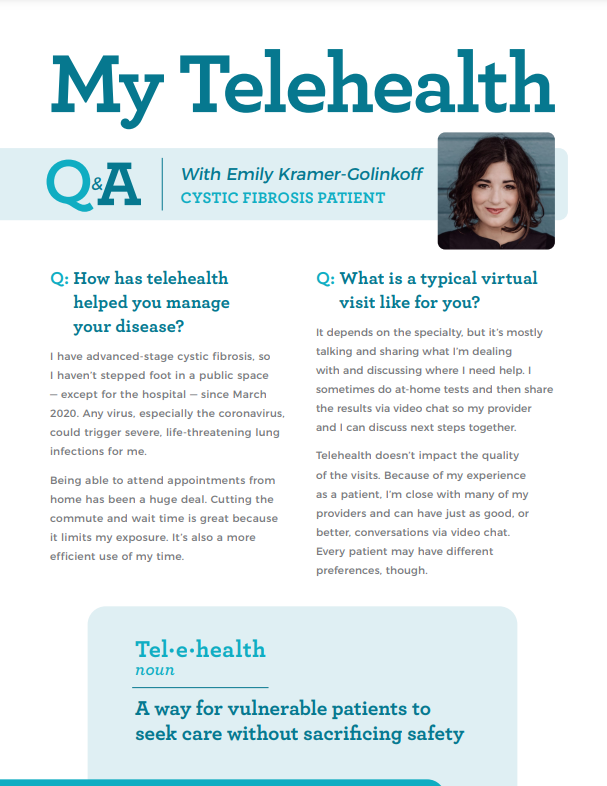Papers
Cystic fibrosis is a rare genetic disorder that affects approximately 40,000 people in the United States. The condition primarily affects the lungs. Thick mucus buildup and inflammation in the airways make it difficult to breathe. As it progresses, patients may experience severe lung damage and episodes of hypoxia.
Cystic fibrosis treatment advances allow many patients to live into middle age. But longer lives bring a higher risk of colorectal cancer, the third deadliest cancer in the United States. The Cystic Fibrosis Engagement Network and its members recommend the following steps to reduce colorectal cancer among people with cystic fibrosis.
Q: How has telehealth helped you manage your disease?
I have advanced-stage cystic fibrosis, so I haven’t stepped foot in a public space — except for the hospital — since March 2020. Any virus, especially the coronavirus, could trigger severe, life-threatening lung infections for me. Being able to attend appointments from home has been a huge deal. Cutting the commute and wait time is great because it limits my exposure. It’s also a more efficient use of my time.
Q: What’s the best way to define step therapy?
I have found people respond better to the term “fail first.” It’s more intuitive for patients. When they hear “fail first,” it clicks with them that they are being forced by their insurer to try a different medication and only get the one they were prescribed if the first “fails” to help.
The Institute for Clinical and Economic Review wants to assess the cost-effectiveness of breakthrough drugs for cystic fibrosis. But their analysis overlooks key points.
Co-pay coupons are a common tool to help patients with chronic conditions cover the cost of expensive medications. Historically, co-pay coupons’ value has counted toward a patient’s annual deductible. Once the deductible is met, the patients pays a modest co-pay – a fixed amount – per prescription.
Patients can be denied access to their medicine for days, even weeks because of a practice called “prior authorization.” It’s the process whereby insurance companies must approve a physician-prescribed medicine, procedure or test before a patient can get coverage.
Co-pay accumulator adjustment programs are presenting patients with an ugly surprise at the pharmacy counter: The card that helps them afford their medication no longer counts toward their annual deductible.
Not everyone can afford the medication they need. To make drugs more accessible, manufacturers sometimes provide co-pay coupons to help patients cover their out-of-pocket pharmacy expenses.
This Health Care Bill of Rights gives voice to the health care needs of the 30,000 Americans who suffer from cystic fibrosis, the most common fatal genetic disease in North America. Individuals with cystic fibrosis have complex medical needs.










